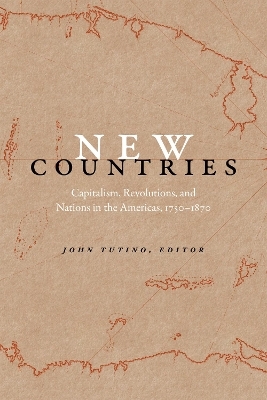
New Countries
Duke University Press (Verlag)
978-0-8223-6133-6 (ISBN)
After 1750 the Americas lived political and popular revolutions, the fall of European empires, and the rise of nations as the world faced a new industrial capitalism. Political revolution made the United States the first new nation; revolutionary slaves made Haiti the second, freeing themselves and destroying the leading Atlantic export economy. A decade later, Bajío insurgents took down the silver economy that fueled global trade and sustained Spain’s empire while Britain triumphed at war and pioneered industrial ways that led the U.S. South, still-Spanish Cuba, and a Brazilian empire to expand slavery to supply rising industrial centers. Meanwhile, the fall of silver left people from Mexico through the Andes searching for new states and economies. After 1870 the United States became an agro-industrial hegemon, and most American nations turned to commodity exports, while Haitians and diverse indigenous peoples struggled to retain independent ways.
Contributors. Alfredo Ávila, Roberto Breña, Sarah C. Chambers, Jordana Dym, Carolyn Fick, Erick Langer, Adam Rothman, David Sartorius, Kirsten Schultz, John Tutino
John Tutino is Professor of History at Georgetown University and author of Making a New World: Founding Capitalism in the Bajío and Spanish North America, also published by Duke University Press. He leads the Georgetown Americas Initiative, which sponsored the workshops which led to this volume.
Acknowledgments ix
Introduction: Revolutions, Nations, and a New Industrial World / John Tutino 1
Part I. Hemispheric Challenges
1. The Americas in the Rise of Industrial Capitalism / John Tutino 25
2. The Cádiz Liberal Revolution and Spanish American Independence / Roberto Brena 71
Part II. Atlantic Transformations
3. Union, Capitalism, and Slavery in the "Rising Empire" of the United States / Adam Rothman 107
4. From Slave Colony to Black Nation: Haiti's Revolutionary Inversion / Carolyn Fick 138
5. Cuban Counterpoint: Colonialism and Continuity in the Atlantic World / David Sartorius 175
6. Atlantic Transformations and Brazil's Imperial Independence / Kirsten Schultz 201
Part III. Spanish American Inversions
7. Becoming Mexico: The Conflictive Search for a North American Nation / Alfredo Avila and John Tutino 233
8. The Republic of Guatemala: Stitching Together a New Country / Jordana Dym 178
9. From One Patria, Two Nations in the Andean Heartland / Sarah C. Chambers 316
10. Indigenous Independence in Spanish South America / Erick D. Langer 350
Epilogue. Consolidating Divergence: The Americas and the World after 1850 / Erick D. Langer and John Tutino 376
Contributors 387
Index 389
| Erscheinungsdatum | 24.11.2016 |
|---|---|
| Zusatzinfo | 34 illustrations |
| Verlagsort | North Carolina |
| Sprache | englisch |
| Maße | 152 x 229 mm |
| Gewicht | 567 g |
| Themenwelt | Sachbuch/Ratgeber ► Geschichte / Politik ► Allgemeines / Lexika |
| Geschichte ► Allgemeine Geschichte ► Neuzeit (bis 1918) | |
| Geisteswissenschaften ► Geschichte ► Regional- / Ländergeschichte | |
| Wirtschaft ► Allgemeines / Lexika | |
| Wirtschaft ► Volkswirtschaftslehre | |
| ISBN-10 | 0-8223-6133-7 / 0822361337 |
| ISBN-13 | 978-0-8223-6133-6 / 9780822361336 |
| Zustand | Neuware |
| Haben Sie eine Frage zum Produkt? |
aus dem Bereich


